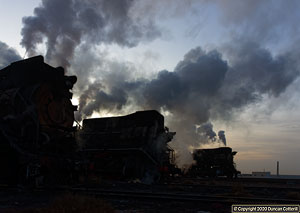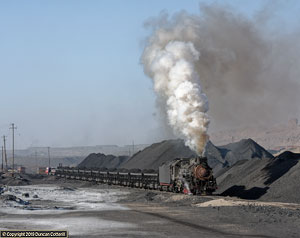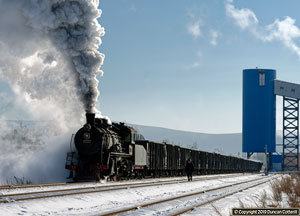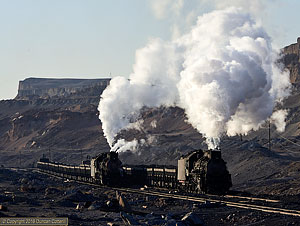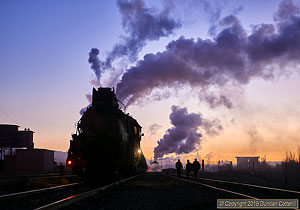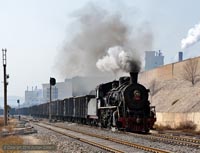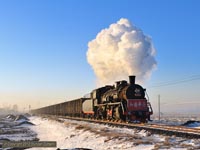China : Nov/Dec 2019
29/03/20 20:28
The report from my latest trip to China in late 2019, only 3 months late this time. Once again the destination was the opencast coal mine at Sandaoling, just about the only place where real working steam locomotives can be seen these days.
go to Sandaoling Soldiers On report
go to Sandaoling Soldiers On report
China : Nov/Dec 2018
09/10/19 17:32
Another very late report from a trip to China, this time in November and December 2018, so less than a year late! This time the visit was just to the steam worked mining railway at Sandaoling.
go to Another Fling to Sandaoling report
go to Another Fling to Sandaoling report
China : Nov/Dec 2017
05/10/19 14:04
Very late but hopefully still of interest to some. This report dates from a trip to China in late 2017, visiting the mining systems at Wujiu and Sandaoling, both of which feature working steam, and including some observations of the current main line scene, principally around Beijing.
go to Steam, Snow and Sand report
go to Steam, Snow and Sand report
China : Nov/Dec 2016
14/12/16 13:05
The steam age is rapidly coming to an end in China but, even at the end of 2016, there was just enough activity to justify another visit. This report covers a three week trip in November and early December to see the SY Class 2-8-2s on the mining railways at Pingzhuang and Wujiu and the JS Class 2-8-2s in the opencast mine at Sandaoling. Observations of diesel and electric locos on the national system and industrial lines are included as well.
go to The End Of The Line? report
go to The End Of The Line? report
China : Nov/Dec 2015
14/12/15 15:52
Real working steam locos are becoming very hard to find, even in China, but two of the remaining operations are still exceptionally good. This report covers a 3 week trip based around visits to the steam worked mining railways at Fuxin and Sandaoling in November and December 2015. The mining line at Pingzhuang and Fushun’s Old Steelworks were also visited, with mixed results. The report includes observations on the main line, all diesel or electric these days.
go to Steaming On report
go to Steaming On report
China : Nov/Dec 2014
16/12/14 10:22
With the Rongshan NG line back in action and a new steam worked line due to open at Sandaoling, November 2014 seemed a good time to visit China again. In the event we missed out on both but still had a very rewarding trip. This report covers what we saw at Fuxin and Sandaoling, neither of which disappointed.
go to report
go to report
China : Mar 2014
20/03/14 17:44
This illustrated report covers a two week trip to the Baiyin and Tiehejinchang lines in China's western province of Gansu from 3 to 17 March 2014.
Both lines visited use a mixture of steam and diesel traction and, with steam in rapid decline, things didn't turn out exactly as anticipated.
go to report
Both lines visited use a mixture of steam and diesel traction and, with steam in rapid decline, things didn't turn out exactly as anticipated.
go to report
China : Nov/Dec 2013
18/01/14 11:36
A trip to photograph steam locomotives on the best industrial lines, including the huge opencast coal mine at Sandaoling, the largest industrial steam user, with around 17 locos required in traffic every day, and the last large scale user of JS class 2-8-2s. The SY worked Fuxin and Pingzhuang mining systems and the old steelworks at Fushun also featured. Diesels and electrics were not ignored entirely with visits to Beijing's main station and to the Fushun Mining Railway, with its remarkable electrics.
go to report
go to report
China : November 2012
15/12/12 11:26
The last few years have seen many of the best Chinese steam locations dieselise, electrify or abandon their rail systems altogether. Just enough survived to justify one last trip in November 2012. This report covers what we found at Bajiaotai, Fuxin, Pingzhuang and Sandaoling during an 18-day trip. There are also extensive observations of the current Chinese rail scene from journeys totalling over 6000km.
go to report
go to report
China : November 2011
11/12/11 08:37
Chinese steam may be in terminal decline but there are still a few high quality operations good enough to justify another trip. This report covers a very productive three week trip to the north of the country in November 2011, concentrating on the industrial railways at Fula’erji in Heilongjiang, Beitai and Fuxin in Liaoning and Sandaoling in Xinjiang, with brief visits to Shenyang, Fushun and Pingzhuang as well.
go to report
go to report
China : Nov/Dec 2010
31/12/10 20:07
A marathon three-week trip to northern China in Winter 2010, visiting the best of the remaining steam operations at Sandaoling, Jixi, Huanan, Tiefa, Fuxin, Beipiao, Pingzhuang, Yuanbaoshan and Hongmiao. Despite the decline in steam working over the past year, we still saw almost 60 locos in steam.
go to report
go to report
China : March 2010
11/04/10 14:11
A visit to two of the best remaining steam-worked industrial systems in China. The coal mines around Jixi in the north-east still employ around 20 SY class 2-8-2s on an extensive network of railways running through a mixture of impressive industrial architecture and pleasant countryside. Much further west, at Baiyin, another fleet of SYs serves a complex of ore smelters in the desert. Both operations are threatened with modernisation in the near future and the first diesels had already arrived at Baiyin by the time of our visit.
go to report
go to report
China : November 2009
30/11/09 07:42
The days when steam locomotives were easy to find are long gone and the best locations are often far from each other. On this trip we set out to visit two of the furthest apart, the opencast coal mine at Sandaoling in the north-western province of Xinjiang and the narrow gauge coal railway at Huanan in eastern Heilongjiang. These are two very different operations yet they share some common features beyond the fact that they both haul coal, most notably the use of banking engines.
go to report
go to report
China Feb/Mar 2009
31/03/09 07:20
The opencast coal mine at Zhalainuoer is probably the greatest steam spectacle left in the world today but it won’t be for much longer. Railway operations within the big pit are expected to cease later this year and diesels are currently being acquired for the surface lines as well. The opportunity to visit Zhalainuoer for one last time was just too good to miss. We also visited Baiyin, a much smaller operation but with a reasonably long main line featuring semi-desert scenery and steep gradients.
go to report
go to report
China : November 2008
30/11/08 06:23
A short trip to two of the best surviving steam operations. We planned to start with a couple of days at Jixi, a coal mining centre employing more than 20 SY class 2-8-2s, and then to move on to the narrow gauge operation at Huanan, potentially the best surviving narrow gauge line in China but notoriously unreliable these days. Things didn't quite go according to plan!
go to report
go to report
China October 2008
31/10/08 06:20
A trip to photograph diesels on scenic lines in the north-east of China, starting with the Tonghua-Hunjiang area then Fushun, Bei'an, Mudanjiang and finishing on the Beijing-Longhua line. As well as the diesels, there are a few industrial electrics on standard and narrow gauges and a handful of steam locomotives as well.
go to report
go to report
China : Feb/Mar 2008
31/03/08 06:03
After three successful spring trips to North-East China, it seemed time to do something different. This time we travelled west from Beijing to visit three steam operations along the Yellow River. The steelworks at Baotou is largely dieselised but still employs a number of SYs. Further west at Gongwusu, a rarely visited coal mining system uses a couple of JSs. Our final destination was the mine and smelter complex at Baiyin with its active fleet of SYs.
go to report
go to report
China : Nov/Dec 2007
30/12/07 05:52
This trip turned out very differently to the one we planned. The idea had been to get some shots of Huanan in the snow and have another go at Huludao before the diesels arrived. As we were in the area, it seemed sensible to spend a few days in Jixi as well. In the event, there was no snow and Huanan wasn’t running any trains. Huludao had two brand new diesels and no steam on line work. Fortunately JIxi didn't disappoint and Nanpiao proved to be an acceptable alternative to Huludao.
go to report
go to report
China : March 2007
31/03/07 05:24
This visit to China started with a few days photographing modern traction around Beijing, including SS4Gs on the busy Datong - Qinhuangdao coal line and 8Ks on the Fengtai - Shacheng route. The remainder of the trip was spent in the North-East visiting three of the surviving steam-worked colliery systems at Jixi, Hegang and Zhalainuoer.
go to report
go to report
China : January 2007
31/01/07 05:13
Shibanxi had been near the top of my "must visit" list for some time but it was difficult to combine with the best of the remaining steam locations in northern China. There was also a problem deciding when to visit. There just didn’t seem to be a good time of year to go to Shibanxi. The opportunity for a short trip arose in January 2007 so we took the plunge and set off for Sichuan to see what all the fuss was about. On the way, there was time to investigate some rarely reported SYs around Chengdu as well.
go to report
go to report
China : Nov/Dec 2006
31/12/06 05:05
A winter visit to photograph steam worked coal railways in the north-east of China. We visited Jixi, where SYs work on 5 separate colliery systems, Huanan, a superbly scenic narrow gauge operation and Fuxin, where steam operation continues despite the decline of mining in the area.
go to report
go to report
China : Sep/Oct 2006
30/10/06 04:53
With no QJs on the Jitong Railway this autumn, my thoughts turned to photographing China's diesels and electrics. Steam is now confined to industrial operations and I was beginning to miss the excitement of photographing big trains on scenic main lines. China has a remarkably varied modern traction scene and those used to seeing nothing but QJs, JSs and SYs might be surprised at the plethora of different diesel and electric classes in use.
go to report
go to report
China : Feb/Mar 2006
31/03/06 16:37
A return visit to the best of the Manchurian industrial lines. Most of the trip was devoted to visiting the steam worked colliery systems at Meihekou, Jixi and Zhalainuoer. A day exploring in the area east of Harbin turned up a new steam location but three months too late. Although the emphasis was on steam, diesels working on the main lines weren't ignored.
go to report
go to report
China : November 2005
30/11/05 15:56
A visit to several recently discovered steam worked industrial systems in Xinjiang and Gansu provinces in the north west of China, including the massive opencast coal mine at Sandaoling where over 30 steam locos were in daily use.
go to report
go to report
China : September 2005
30/09/05 15:48
The Daban to Chabuga section of the JiTong Railway was still steam worked in September 2005 but the diesels started to take over at the beginning of October. This report covers my last trip to see steam on this wonderful line, the last steam worked main line on the planet. We also spent a few days on the excellent Huanan narrow gauge railway in north-eastern Manchuria.
go to report
go to report
China : Feb/Mar 2005
31/03/05 20:11
This report covers a short trip to some of the best steam worked industrial railways in the North East of China during early March 2005. We visited Meihekou, Jixi, Dayan and Jalainur. Winter in the North East can be unbearably cold but spring tends to be warm and wet. For a brief period in between it's not too cold but still bright and sunny. Fortunately, our trip coincided with this transition and we enjoyed virtually unbroken sunshine for the duration.
go to report
go to report
China : Jan/Feb 2005
28/02/05 20:08
Bryan Acford reports from his 20th Anniversary trip to China, visiting Pingdingshan, Yuzhou, Xingyang, Tiefa, Lindong, Yuanbaoshan and Pingzhuang.
go to report
go to report
China : Dec 2004/Jan 2005
31/01/05 20:04
This was a short trip to Central China where several of the operations in the Xuzhou area sounded interesting. We were attracted partly by the presence of high deflector QJs as well as locos from the final batch of 20 built in 1988. There were risks of course, not least from creeping dieselisation. However, the situation was far worse than we had anticipated.
go to report
go to report
China : Nov/Dec 2004
31/12/04 19:57
With the diesels rapidly taking over at Jingpeng we made one last visit there to bid farewell to what had been the greatest steam show on earth before moving on to Lindong for some more big steam action.
go to report
go to report
China : September 2004
30/09/04 19:54
A very successful trip to JIngpeng Pass in perfect late summer weather with blue skies, green hills, cold mornings and clear light. A real glint and silhouette spectacular. Unbeknown to us at the time, diesels started to work over the pass within a couple of weeks of our visit. We also visited Lindong in poor weather and then trekked north to the excellent Huanan narrow gauge operation.
go to report
go to report
China : Feb/Mar 2004
31/03/04 19:49
Bryan Acford's report of his visits to Dahuichang, Lindong and Jingpeng in late winter 2004.
go to report
go to report
China : February 2004
28/02/04 19:45
An all industrial bash covering Tongchuan and its celebrated JFs, Pingdingshan, Nanpiao, Huludao and Tiefa plus visits to the Beijing and Shenyang museums.
go to report
go to report
China : December 2003
31/12/03 12:55
A winter visit to the industrial railway at Nanpiao followed by the inevitable trip to JIngpeng and Lindong.
go to report
go to report
China : September 2003
30/09/03 12:49
China : Aug/Sep 2003
29/09/03 12:46
A return visit to the JiTong line in late Summer when the hills were green and Jingpeng Pass was deserted. After a week or so I teamed up with Bryan Acford to visit Lindong and Chabuga.
go to report
go to report
China : Feb/Mar 2003
31/03/03 12:30
A late winter trip to Jingpeng Pass followed by the industrial railways at Yuanbaoshan, Pingzhuang and Tiefa. The trip finished off with a last visit to the superb Weihe Forestry Railway less than two weeks before its closure.
go to report
go to report
China : Nov/Dec 2002
28/12/02 12:16
The usual November trip to the JIngpeng Pass and Lindong / Chabuga areas on the JiTong line with a short visit to Pingzhuang and Yuanbaoshan mine railways as well.
go to report
go to report
China : Sep/Oct 2002
31/10/02 12:13
Our first Autumn trip to China and our first visit to the industrial railways at Pingdingshan, in Henan province, and Yuanbaoshan and Pingzhuang, south of Chifeng. We also spent some time on Jingpeng Pass and around Lindong and Chabuga on the JiTong Railway and paid a brief visit to the Dahuichang narrow gauge line in Beijing.
go to report
go to report
